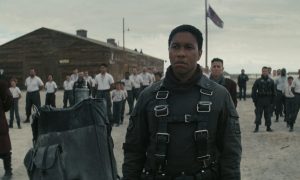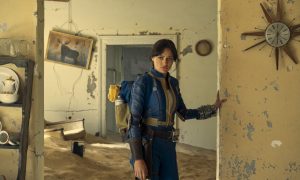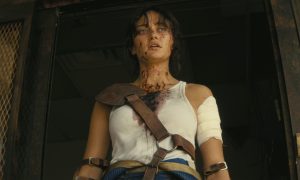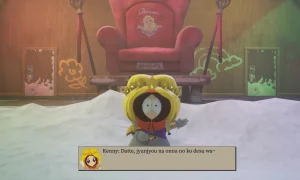When you’re making a big-budget, AAA title, it’s hard to focus on anything besides delivering an action-packed thrill ride of a game in the hopes of selling enough copies to recoup its massive costs. Independently developed games, on the other hand, are usually made by more humble means, without the pressure of a large publisher or shareholders inhibiting the creative process.
Josh Long, a former AAA developer, decided to branch out and make something closer to his heart. Oscar is the emotional story of a young girl who is trying to find her voice in a world that’s beckoning her to grow up. Josh and I talk about what it’s like to make the indie jump, the challenges of conveying emotions in video games, the world of Oscar and how it evolves as you get further along in the story, and more.
Oscar is currently a Kickstarter project with 25 days left to reach its goal.
GT: Josh, thank you for taking the time to talk about Oscar, it’s a very intriguing game. As the Kickstarter states, you’ve already got several games under your belt – can you tell me about your background in the industry?
Josh: Hey Sean, we appreciate the interest in Oscar. I began as a pro gamer in a game called Dawn of War almost 10 years ago; I represented Canada at the World Cyber Games a couple of times. I was looking to write music for games when Relic Entertainment, the developer of the title gave me a ring out of nowhere and asked me to work for them. I knew getting involved in games in any capacity was a tough task so I decided any way in would be a good start; several years later I was the lead multiplayer designer on the Dawn of War 2 series, the sequel to the game I competed in. I spent 6 years at Relic and a year at Blackbird Interactive [the team working on the new Homeworld title], before Oscar grew from a side project into something I believe deserved my full commitment.
GT: How has the transition to being an independent developer been? It must feel a lot different going from working on huge teams to being part of such a small one.
Josh: It’s been a pretty big roller coaster ride; I’ll admit I was fully prepared and researched as to what it means to be an entrepreneur but there’s no comparison for the emotions you go through until you get there. Without someone looking over your shoulder nodding their head, letting you know you’re doing the right thing, it’s tough. I left because I wanted to do something new, but also to tackle an area where I think there’s an audience that needs speaking for; It’s taken a lot of resolve to keep going but in the end regardless of what aspect of this endeavor can be thought of as pass or fail, I’ve grown a lot as a person so I feel the journey has been reward enough in itself. Of course I’d like it all to work out, but if it was guaranteed then it wouldn’t have been a worthy risk in the first place. It’s satisfying to bet it all; nothing wagered, nothing gained right?
Managing a big team was of course a really big burden; there’s not a lot of official training on the job so in one fell swoop I went from being the newbie asking what I’m supposed to do, to suddenly becoming the guy who’s supposed to know everything. It was really stressful to not really feel like I knew what I was doing, at least enough to guarantee the success of the product and the health of the team. At first I thought it was just part of the job, and certainly in the industry that element of extreme risk is a burden every lead has to bear. I left to become indie because I think that’s the space in which we can develop solutions to those types of problems. I don’t think AAA are the bad guy, but they have too much on the line just to ship a game to really spend the time fixing problems with process and studio structure.
GT: The transition certainly sounds like a pivotal experience for you, and I’m sure anyone who decides to go independent. Oscar is also about deep experiences – emotion, conveyed through detailed art, seems to be the backbone of the game’s development. Can you talk about the experience you’re aiming for in Oscar?
Josh: In Oscar we want the player to generate their own deep attachment to the game’s experience, especially it’s narrative. We use subtle cues (including art as you mentioned) to nudge the player’s curiosity as to what’s going on. While we don’t mind the appearance of an artsy 2D platformer, this is actual a convenient entry point for users; We’re actually going for a lot more but we don’t want to intimidate the average guy logging onto the Steam store.
Oscar’s intended to come across as just another 2D platformer, but as the game progresses we start to toy with everything from perspective, to gameplay, to the coherence of the environments. At first player’s will understand the world as most any other video game: a protagonist wandering through a fantastic world. As they keep playing though, we slowly insert items and interactions into their environment that don’t fit this profile; as they naturally want to understand the logic behind the world in order to feel comfortable again, we want these stray pieces to lead them to an empathetic connection with what Oscar [the character] is hiding from us.
In Oscar we want to tackle tough, real-world issues that don’t typically get much air-time; most people don’t enjoy talking about serious problems in the world. Much like other forms though, we see video games as an opportunity to turn the ugly parts of the human experience into something beautiful for the recipient to absorb. It’s only fitting that Oscar’s persistent real-life problems result in her beautiful, if somewhat ignorant perspective of what’s around her. Kind of like sand in an oyster, or coal turning into diamonds, we learn why her problems persist and get to explore her beautiful coping mechanism as it battles her issues.
We never tell the player what’s going on; there are no convenient sheets of diary on the ground, no Bioshock-style audio logs to be found. Everything is absorbed through the experience and we think this kind of objective discovery of the narrative is key to dealing with sensitive issues; we never tell the player how to feel about the story. We simply use games as a way to reveal a slice of reality that we all face, children or not. Everyone has problems they can’t explain to others.

GT: You’ve said that the journey of Oscar can only be told through video games. What specifically about Oscar benefits from video games, as opposed to other mediums such as comics, novels, and film?
Josh: The real oomph that comes from articulating the issues in Oscar by specifically using interactive media is the sense of empathy as I previously alluded to; We’re not going to tell the player what Oscar’s experiencing, we’re going to use the game to make them experience those emotions and thus feel what she’s feeling in order to understand her world. For example, from a gameplay perspective we simply use whatever is available [within technical reason] to help describe her situation. Sometimes the game enters 2.5D like Double Dragon or Castle Crashers in order to better convey what she’s going through. In another level we actually let Oscar navigate the world by herself while the player controls the environment. We want to put the player in a position where they recognize the dynamics of Oscar’s problems.
We want them to recognize those same feelings they’ve had when they’ve experienced what she’s going through. Oscar tries to articulate something we’ve all experienced because it’s rarely talked about; to that end I believe it’s rarely talked about because it’s really hard to convey all the complexities of some problems in words. We’ve used other media like documentaries or songs to handle and bring to light tougher world issues, but the specific set of problems we raise awareness of in Oscar seem to find an elegance of expression in a scenario where we can define the player’s interactions as well as what they see and hear.
GT: What would you say has acted as inspiration for your work on Oscar? Be it other video games, personal experience, and so on?
Josh: Something I’ve tossed around with other designers is the common symptom in that so many of us seem to be jack-of-all trades; I digress though, there were a several key contributing factors that led to my full commitment to Oscar. Firstly, it’s not actually my story; it was written by a game journalist I met while running a press event at Relic. I could tell she really had the knack for expressing her narrative through games and it was only when she injected her tale into an average 2D platformer that it began to change the focus of the game; it also demanded that I reach deep into my designer expertise to try and express what she was trying to get across in the game. I must admit that the story is sadly true to life, as much as I wish it was fictional. I think what really hits home about the game is that when you’re done and you understand what just happened, it has an immediate impact on how you see other people around you. How famous the phrase “I’m fine”, we tell others and are told, when often it’s not the case.
Personally I’ve always been ‘successful’ in life in the traditional sense. Good grades, well-liked, successful career etc., but underneath it at times there was a deep unhappiness that no one seemed to want to tolerate. Somewhere between all the excellence I knew something was wrong, but for my entire childhood I had to cope with it because no one would even let me seek help. So I relate to complex, uncommon problems that are difficult to articulate and how they can affect your day-to-day life.
Perhaps when it comes down to it, the impact of that childhood made it hard for me to trust my own judgment, because I wanted to agree with others that everything was great and that I should ignore my own inner doubts. Obviously that’s unhealthy, and in part investing in a project and cause that are risky but that I believe in is kind of way for me to reclaim my confidence in my own judgment as a person. Awesomely enough to that end, maybe this will all work out smashingly, maybe not, but it’s really helped me grow as a person regardless.

GT: It’s great to see a creator injecting his personal experiences into his work, I think gamers always resonate with the passion poured into the games they are playing. I’d like to dive into some of the technical aspects of Oscar. What tools are you using to build the game?
Josh: Admittedly something like Unity rolling around really changed what was possible in the indie space; It’s not always my favorite development tool but it’s certainly much easier to navigate than the crazy software I had to handle at a AAA company. Really we’re trying to keep the pipeline as simple as possible in order to let the artistic parts of the game speak; part of why we chose a 2D setting was because we could transition from concept to in-game assets pretty much directly. I’m always quite sad when a highly-paid artist draws an evocative piece to inspire the team and inform the game, only to have actual execution drive the final experience into something quite different.
On the musical side, I use pretty standard sound libraries and tools like Cubase, but I actually grew up formally trained in both piano and violin; I want to write as much of the soundtrack as possible on actual instruments. A computer can technically throw a bunch of pro sounds and emulate an orchestra, but there’s a quality I’ve learned to respect in a human performance. The nice thing about Unity, getting back to the backbone, is that I also was able to use it in my time at AAA; porting is really quite trivial. I like knowing that if this all works out there’s little stopping us from putting Oscar on everything from Mac to PSN to something like the Vita.
GT: I look forward to playing Oscar someday soon! Josh, best of luck to you and your team on the Kickstarter.
Josh: Thanks Sean, it’s been a pleasure.
Sean started playing video games in infancy. He was not given a choice as much as a directive from his parents to be the best gamer on Earth. Sean was subjected to 10-12 hours of rigorous daily gaming throughout his youth, mastering the most complex video games and dominating online competitions. Sean's symbiotic relationship with video games led to writing about them for various gaming websites, and he is currently involved in sales strategy and analytics at one of the largest video game publishers in the world. Sean's mission is simple: Turn 100% of the human population into gamers, willingly or otherwise.



 Buy Now
Buy Now
 Buy Now
Buy Now
 Buy Now
Buy Now
 Buy Now
Buy Now
 Buy Now
Buy Now
 Buy Now
Buy Now















